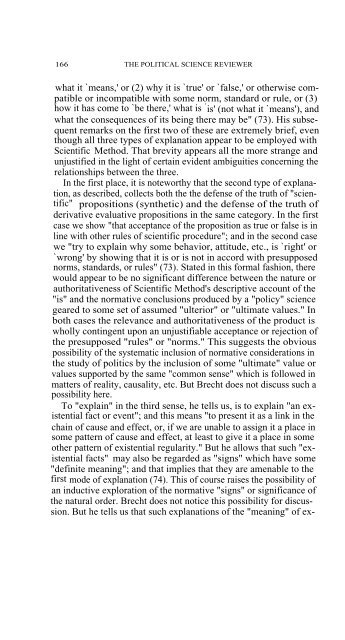ARNOLD BRECHT'S POLITICAL THEORY REVISITED Political ...
ARNOLD BRECHT'S POLITICAL THEORY REVISITED Political ...
ARNOLD BRECHT'S POLITICAL THEORY REVISITED Political ...
Create successful ePaper yourself
Turn your PDF publications into a flip-book with our unique Google optimized e-Paper software.
166 THE <strong>POLITICAL</strong> SCIENCE REVIEWER<br />
what it `means,' or (2) why it is `true' or `false,' or otherwise compatible<br />
or incompatible with some norm, standard or rule, or (3)<br />
how it has come to `be there,' what is ' is' (not what it `means'), and<br />
what the consequences of its being there may be" (73). His subsequent<br />
remarks on the first two of these are extremely brief, even<br />
though all three types of explanation appear to be employed with<br />
Scientific Method. That brevity appears all the more strange and<br />
unjustified in the light of certain evident ambiguities concerning the<br />
relationships between the three.<br />
In the first place, it is noteworthy that the second type of explanation,<br />
as described, collects both the the defense of the truth of "scientific"<br />
propositions (synthetic) and the defense of the truth of<br />
derivative evaluative propositions in the same category. In the first<br />
case we show "that acceptance of the proposition as true or false is in<br />
line with other rules of scientific procedure"; and in the second case<br />
we "try to explain why some behavior, attitude, etc., is `right' or<br />
`wrong' by showing that it is or is not in accord with presupposed<br />
norms, standards, or rules" (73). Stated in this formal fashion, there<br />
would appear to be no significant difference between the nature or<br />
authoritativeness of Scientific Method's descriptive account of the<br />
"is" and the normative conclusions produced by a "policy" science<br />
geared to some set of assumed "ulterior" or "ultimate values." In<br />
both cases the relevance and authoritativeness of the product is<br />
wholly contingent upon an unjustifiable acceptance or rejection of<br />
the presupposed "rules" or "norms." This suggests the obvious<br />
possibility of the systematic inclusion of normative considerations in<br />
the study of politics by the inclusion of some "ultimate" value or<br />
values supported by the same "common sense" which is followed in<br />
matters of reality, causality, etc. But Brecht does not discuss such a<br />
possibility here.<br />
To "explain" in the third sense, he tells us, is to explain "an existential<br />
fact or event"; and this means "to present it as a link in the<br />
chain of cause and effect, or, if we are unable to assign it a place in<br />
some pattern of cause and effect, at least to give it a place in some<br />
other pattern of existential regularity." But he allows that such "existential<br />
facts" may also be regarded as "signs" which have some<br />
"definite meaning"; and that implies that they are amenable to the<br />
first mode of explanation (74). This of course raises the possibility of<br />
an inductive exploration of the normative "signs" or significance of<br />
the natural order. Brecht does not notice this possibility for discussion.<br />
But he tells us that such explanations of the "meaning" of ex-
















